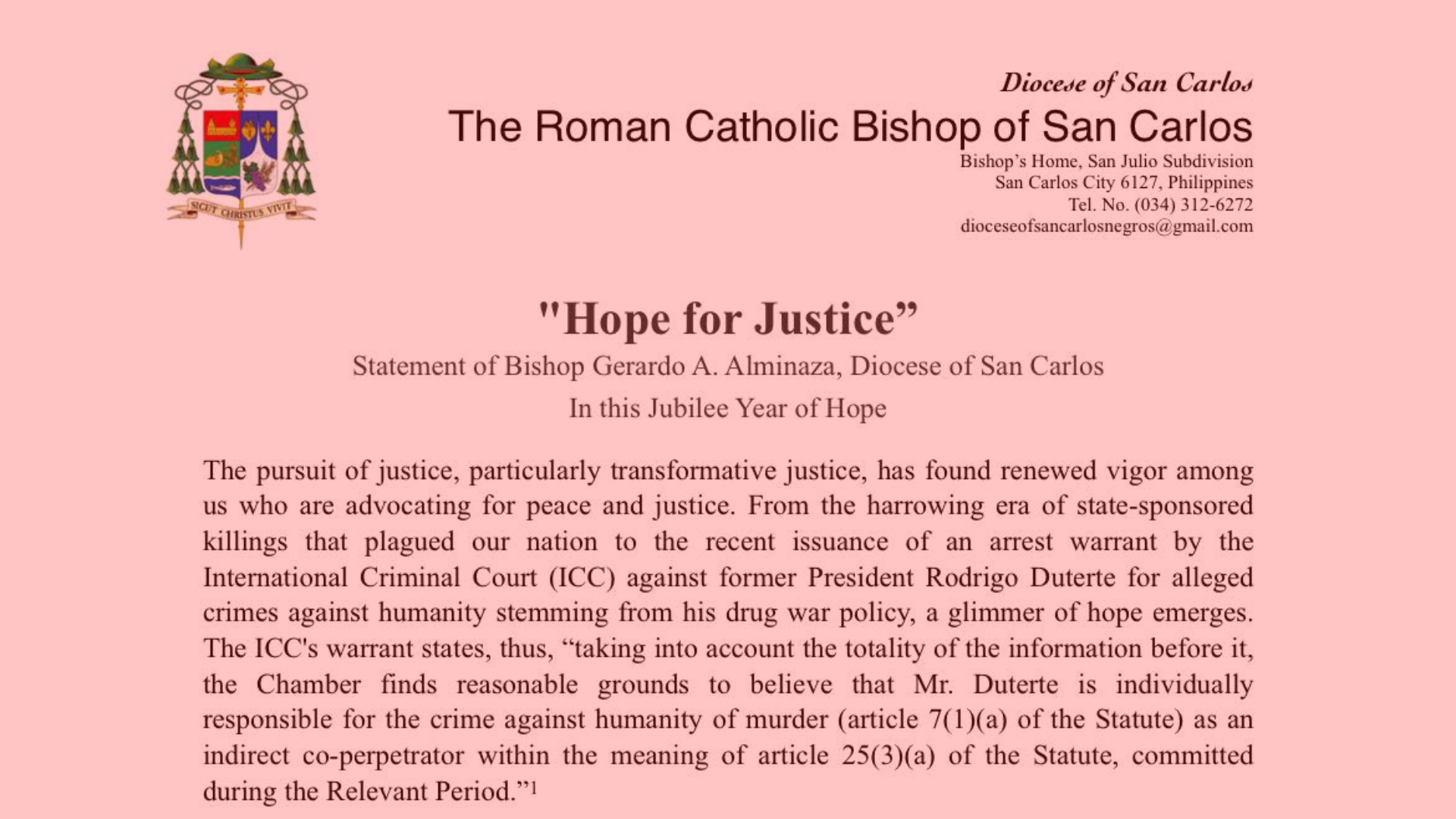“Hope for Justice”
Statement of Bishop Gerardo A. Alminaza, Diocese of San Carlos In this Jubilee Year of Hope.
The pursuit of justice, particularly transformative justice, has found renewed vigor among us who are advocating for peace and justice. From the harrowing era of state-sponsored killings that plagued our nation to the recent issuance of an arrest warrant by the International Criminal Court (ICC) against former President Rodrigo Duterte for alleged crimes against humanity stemming from his drug war policy, a glimmer of hope emerges. The ICC’s warrant states, thus, “taking into account the totality of the information before it, the Chamber finds reasonable grounds to believe that Mr. Duterte is individually responsible for the crime against humanity of murder (article 7(1)(a) of the Statute) as an indirect co-perpetrator within the meaning of article 25(3)(a) of the Statute, committed during the Relevant Period.”
This development brings a measure of hope and solace to the thousands of families who lost their loved ones during the Duterte regime’s war-on-drugs and war-on-rights, a period marked by impunity and reward-driven killings. The Diocese of San Carlos has consistently called for an end to these killings. We have engaged in various initiatives, including the solemn ringing of church bells to awaken consciences, the symbolic planting of trees as a testament to life and justice, and unwavering support for the victims’ families.
Indeed, hope persists for those who were denied justice, whose loved ones were deprived of their day in court and even a proper investigation into their deaths. We yearn for justice for the innocent lives extinguished. As a pastor, I have personally borne witness to the devastating consequences of this violence. I presided over the heart-wrenching funeral masses of activists Zara Alvarez, Dr. Mary Rose Sancelan, and her husband, all murdered for their dedication to the poor and their tireless work for justice and peace in Negros Island. I also offered prayers at the wake of Skyler Bladen Abatayo, a four-year-old boy tragically killed by a stray bullet during a flawed drug raid in Cebu City. It is deeply troubling that many remain unconvinced of the profound injustice perpetrated through these systematic killings, and that, tragically, former President Duterte’s actions garnered admiration from some.
As a pastor, it pains me to acknowledge that some among us continue to support former President Duterte’s campaign of violence, justifying the killings as a solution to the nation’s drug problem. They remain blinded by the false narrative that criminality and drug addiction can be eradicated through death and execution. I pray for them even as I challenge them to rethink their position as some have already done! Impunity has long gripped the Philippines. Former President Duterte’s penchant to kill and slaughter flourished under these conditions. Holding him accountable will be a warning to other leaders who want to unleash human rights violations (HRVs) in the future.
The Church, one of the few institutions that stood unafraid during former President Duterte regime, remains steadfast in its call for justice. However, we must also recognize the complicity of those who enabled these atrocities. Thus, we must engage in a critical re-evaluation of our values as believers, reaffirming our commitment to the sanctity of all life.
The Church must remain a powerful voice against injustice and any form of tyrannical solution to social problems. We must champion transformative solutions that address the root causes of the social ills plaguing our nation. We must resist the temptation to despair and fight against indifference because “No one can be authentically human while he prevents others from being so” (Paulo Freire) or does nothing to help. As we always say in Caritas Philippines, “Walang Iwanan” “We leave no one behind,” for as St. Paul constantly reminds us, “If one part suffers, every part suffers with it….” (1 Cor 12:26). Pope Francis also keeps reminding us: “Everything is connected” and “No one is saved alone” (Laudate Deum, 19).
In the Diocese of San Carlos, we capture all these in one word: UBUNTU “I am because We are!” (African saying). Our Diocese, coming from these convictions, along with civil and religious institutions, welcome this initial step towards accountability the issuance of an ICC arrest warrant and detention of Mr. Rodrigo Duterte at The Hague, Netherlands, to answer for charges of murder as a crime against humanity. As his arrest warrant stipulated: “Concerning Mr. Duterte’s alleged role as the head of the DDS and subsequently as the President of the Philippines, the Chamber found reasonable grounds to believe that he, jointly with and through other persons, agreed to kill individuals they identified as suspected criminals or persons having criminal propensities, including but not limited to drug offenders, initially in Davao and subsequently throughout the country.”?
We also hope that other perpetrators of this drug war will be brought to justice. Nevertheless, we remain vigilant in the continuing practice of impunity recently, as military attacks and bombings continue to terrorize rural communities in Negros Island, Mindoro and Mindanao. Our struggle for peace and justice must be pursued at all times, always anchored on political charity, as Pope Francis explained in Fratelli Tutti, “Every commitment inspired by the Church’s social doctrine is derived from charity, which according to the teaching of Jesus is the synthesis of the entire Law (cf. Mt 22:36-40).”
From the heart of your shepherd, with all these political confusion, it is my prayer, that may we always be guided to protect life and pursue justice, following God’s sincere pleading in our fragile fraternity “Thou shall not Kill!” We continue to pray, hope, and work for justice!
(Sgd.) MOST REV. GERARDO A. ALMINAZA, DD
Diocese of San Carlos
Feast of St. Joseph, 19 March 2025
